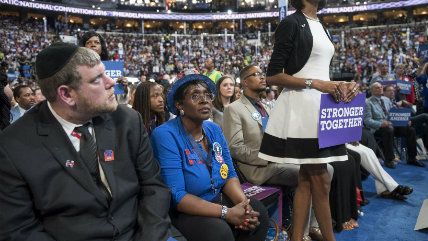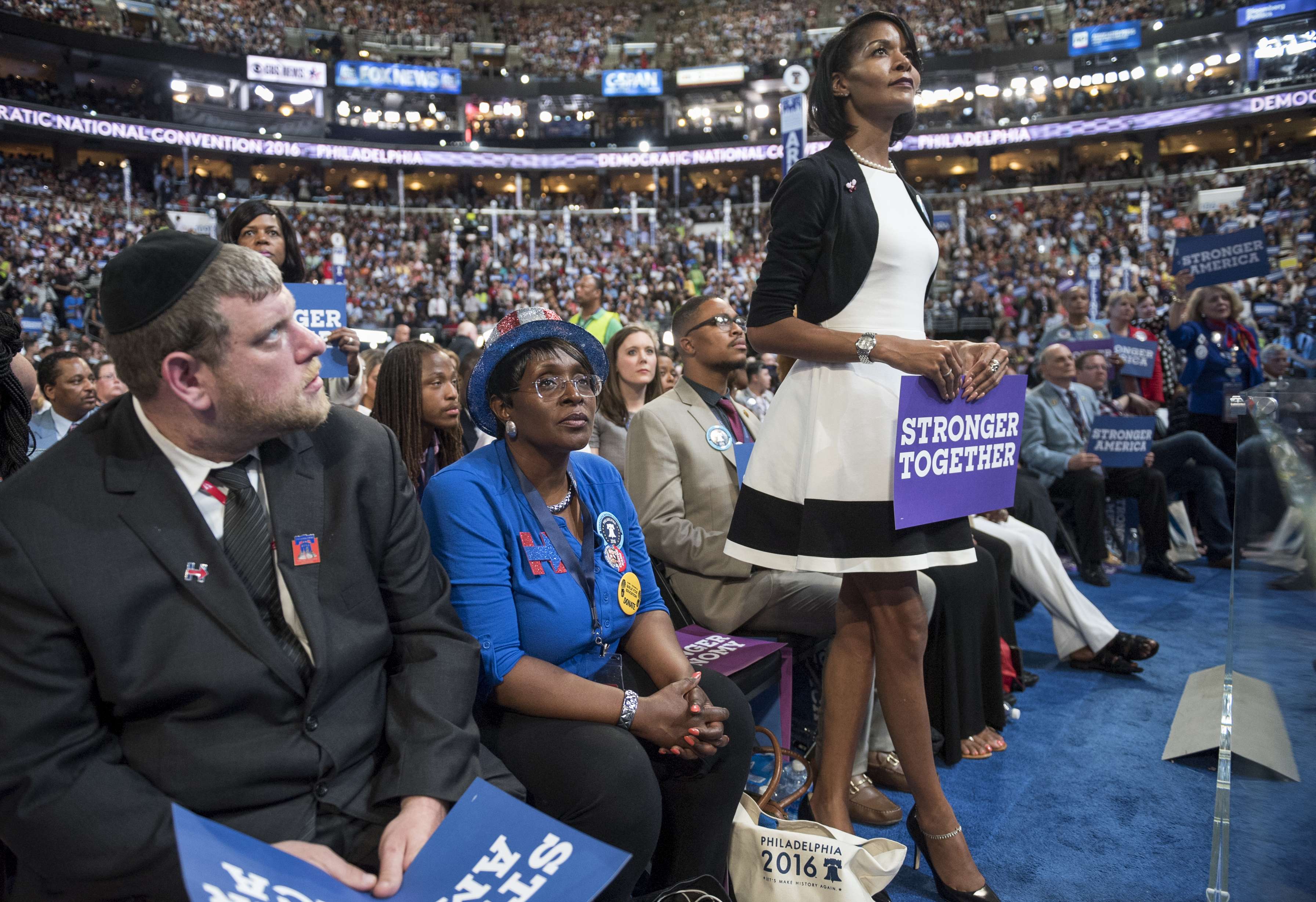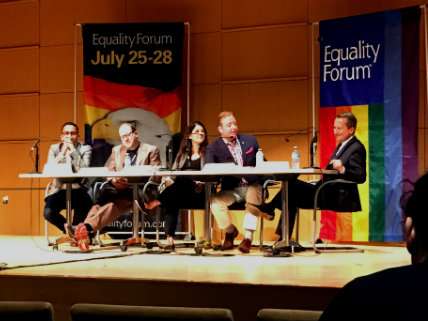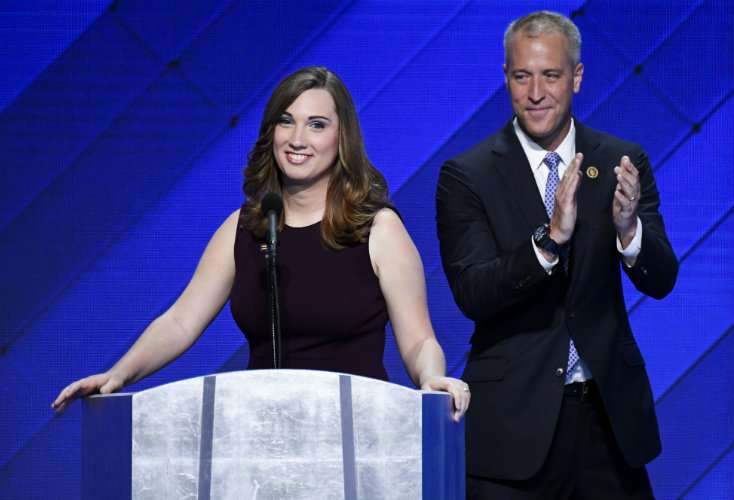New Gay-Friendly GOP Targets LGBTQ Voters With Fabulousness, Fearmongering, While Democrats Embrace Hillary Clinton, Transgender Movement
From a limited-government, classical-liberal perspective, neither convention presented an inspiring future for LGBT activism.


With the battles for same-sex marriage and military privileges won, what's next for the gay-rights movement? Representatives at the recent Republican and Democratic conventions presented drastically different paths forward. For Republicans, it was all about protecting gay people around the world from Islamic extremists. The Democrats' agenda was much more localized, with anti-discrimination laws and transgender visibility among top topics.
Both conventions marked historic moments for the lesbian, gay, bisexual, transgender, and queer (LGBTQ) communities. The Democratic National Convention (DNC) saw its first official transgender caucus and 28 openly transgender delegates (even Montana sent a trans delegate). Overall, there were 515 openly LGBTQ delegates there, according to the Washington Blade. This year's DNC also featured the first openly trans speaker—Sarah McBride—to grace the convention floor of either major party, and delegate Marisa Richmond, a black trans woman from Tennessee, served as the DNC's official timekeeper.
At the Republican National Convention (RNC), gay tech billionaire Peter Thiel gave a headlining speech declaring himself "proud to be gay" and Lynne Patton, vice president of the Eric Trump Foundation, said from the convention floor that "LGBTQ lives matter." One of the hottest after-hours events that week was a pro-queer party where Breitbart contributor Milo Yiannopoulos and Ann Coulter—once notorious for anti-gay statements—were scheduled to speak (Coulter didn't end up making it). Meanwhile, Donald Trump made U.S. political history by uttering the phrase LGBTQ in his nomination acceptance speech—a first for a presidential candidate in either major party.
Yet from a limited-government/classical-liberal perspective, neither convention presented an inspiring future for gay and trans activism. Historically, libertarians have been on harmonious with the LGBT movement—Reason and other libertarian outlets were advocating for same-sex marriage and the repeal of sodomy laws back when Democrats didn't even touch these issues. But as the struggle for equality and acceptance moves away from striking down discriminatory state policies into new (and often strange) directions, this once-solid alliance faces a rocky future. These days, even conservative leaders in the LGBTQ movement side with progressives about the need to for new federal laws to stop discrimination, bullying, and other problems facing the LGBTQ community. Meanwhile, a gay-friendly turn in the Republican Party seems predominantly rooted in foreign policy hawkishness, anti-Muslim sentiment, and animosity toward immigrants.
LGBT at the RNC: Fear, Fabulousness, & Federal Power
Trump may have been the first major-party presidential candidate to explicitly say "LGBTQ" at a convention, but the reason he brought up these "wonderful Americans" (new euphemism alert) was in the service of criticizing Islam. After mentioning June's mass shooting at a gay nightclub in Orlando, Trump promised that as president, "I will do everything in my power to protect our LGBTQ citizens from the violence and oppression of a hateful foreign ideology. Believe me!"
The crowd applauded.
"As a Republican," Trump continued, "it's so nice to hear you cheering for what I just said."
For Gregory Angelo, president of the LGBT-conservatives group Log Cabin Republicans, the entire 2016 RNC was refreshing—especially in contrast to the party's official new platform. The 2016 platform is "the most anti-LGBT in the party's 162-year history," said Angelo at a July 26 Equality Forum panel in Philadelphia, held in conjunction with the DNC.
One new plank of the GOP platform states that "marriage between one man and one woman is the foundation for a free society," while another supports gay-conversion therapy. In contrast, the Democratic platform applauded "last year's decision by the Supreme Court that recognized LGBT people—like every other American—have the right to marry the person they love."
And yet, "the overwhelming majority of Republicans were just as disgusted with the platform as [the Log Cabin Republicans] were," said Angelo. "I talked to hundreds of people during the convention who said, 'We're so sorry about the platform. This doesn't represent me.'"
It's a sentiment echoed by Rachel Hoff, who this year became the first openly-gay person to serve on the Republican National Convention's platform committee. "Outside of the platform committee," Hoff told ThinkProgress, "our party is ready to move on."
The GOP has actually "come really far on LGBT issues" in the past four years, argued Angelo. In part, he credits that to the Trump campaign, which has "jettisoned a lot of the more fiery rhetoric around social issues." Angelo thinks Trump can win more of the LGBTQ vote in November than Mitt Romney did in 2012, when he only earned about 23 percent of the LGBT vote against Barack Obama.
As for what the Log Cabin Republicans would like to see from Donald Trump, Angelo says first, "do no harm on marriage equality." Angelo also pushes an amendment to the 1964 Civil Rights Act—which outlawed discrimination based on race, color, religion, sex, or national origin—that would add sexual orientation and gender identity as protected categories. "Hopefully, we will get to a point with Mr. Trump where we have more explicit confirmations of at least his past declared support for federal non-discrimination protections," he said. The group "has supported some form of federal non-discrimination protection for years," Angelo tells me after the panel. And while "there is definitely a libertarian streak within some of our membership that supports a free-market approach to anti-discrimination," Angelo says support for federal law change is hardly a contentious point among members.
In khackis and a navy-blue suit coat, sitting on the Equality Forum stage, Angelo is the picture of gay respectability politics. His group hearkens back to the recent-past, when gay Republicans had to defend their dual allegiances to skeptics in and out of the party. For Log Cabin Republicans, like so many gay activists of the last two decades, gaining political and cultural ground meant playing it safe and emphasizing commonality with straight folks.
The Log Cabin Republicans stand in stark contrast to the young gay conservatives of the so-called "alt-right," led by Milo Yiannopolous—a kind of Ken Kesey for the Fox News generation—and their campy, gleeful rejection of anything deemed "political correctness." Yiannopoulos mixes Coulter-style provocation with the delivery style of a drunk old queen in a Tennessee Williams play. He embraces over-the-top fashion, calls Trump "Daddy," and makes deliberately taboo statements about sex, among everything else. At an RNC event he headlined, the overall vibe was 'Race-Realist' Chic.
A DJ with white-blond hair stood in front of a large Gadsden flag and kept the room lubricated with loud, pulsating pop remixes. Famous white supremacists like VDare founder Peter Brimelow rubbed elbows with men's rights bloggers, notorious Twitter trolls, and far-right Dutch politician Geert Wilders. Wall artwork—topless young men in the American Apparel style with a twist: "Make America Great Again" hats—came courtesy of photographer Lucian Wintrich, the force behind Twinks4Trump.
Speaker Pamela Geller wore a sequined rainbow top that said "Love Wins," while Yiannopoulos favored a rainbow gun on his shirt, with the message "WE SHOOT BACK." It was a good encapsulation of the four themes guiding this Breitbart News-organized "WAKE UP!" party: fabulousness, LGBT pride, anti-"PC," and a raging desire to shoot some Muslims (or at least cheer-on for other people doing it).
The Village Voice described the WAKE UP! party's vibe as a new and "scary" mix of "European nativism, good old American Islamophobia," and "the rhetorical enlistment of gay rights in a violent nationalist agenda … all dressed up as something young and sexy and fun." Conservative blogger Robert Stacey McCain allegedly joked to Daily Beast contributor Jamie Kirchick that "it's good to be in a room where I'm not the only person on the [Southern Poverty Law Center (SPLC) extremist] list."
Also on SPLC's list of alleged extremists: Geller and her colleague Peter Spencer, who co-founded the American Freedom Defense Initiative, a group that sometimes goes by the alternate name "Stop Islamization of America." At the WAKE UP! party, she opened her talk with this line:
A jihadi walks into a gay bar. The bartender says, "what'll you have?" And the jihadi says, "shots for everyone."
It fell kind of flat.
According to Geller, Republicans are "the party of defense against a jihad that hangs gays from cranes." (Listen to audio from Geller's talk here.) A 21st-century LGBT movement isn't about "transgender bathrooms," said Geller, but "the persecution, oppression, execution of gays living in Muslim countries under the Sharia. That is gay rights." After the cheering for this sentiment died down, Geller suggested that "all free people should reject the increasingly authoritarian Democrat left. The left stands against free speech, in accordance with Sharia."
Geert Wilders' talk was heavier on anti-immigration rhetoric, lighter on the new gay agenda. Founder and head of the popular Dutch Freedom Party, Wilders aspired to be the Netherlands' next prime minister earlier this year, but lost. At the WAKE UP! party, Wilders spoke of a Europe "collapsing" under the weight of constant terror attacks, spawned by "stupid government," open-borders policies, and Muslim immigrants intent on enacting Sharia Law across Europe. [Listen to Wilders speak here.]
European governments "allowed millions, millions of Muslim immigrants to come from Islamic countries to our free Western societies, without any demands of assimilation or integration. And that, my dear friends, is a suicide policy," Wilders warned the crowd of drunk gays, neo-Nazis, and journalists. "We allowed Islam to be planted, and we are facing now, all around us, Sharia law. My friends, you know, Sharia law means terror. It means violence. It means hate."
Yiannopoulos also touched on these themes, though he deferred to Geller as the expert. The left are "traitors to the gays," he declared. "I know you're watching Fusion, Vox, Buzzfed, Mic, Gawker, The New York Times. Fuck the lot of you. Fuck you. You've done nothing for gay people." While the left talks about "transgender pronouns," he continued, "Democrat politicians [welcome] in a religion that wants us dead."
It's hard to tell how much Yiannopouls really believed the logic that liberal immigration policies are the biggest threat facing LGBTQ Americans, but it was clear he was having fun with it. "I'm not the only one who recognizes that Donald Trump is the most pro-gay candidate in American history," he said, to enthusiastic applause.
"If the left wants to turn New York into Raqqa, it's got a fight on its hands, because it's going to have to go up against the gays first."
LGBT at the DNC: Hey, At Least We're Not Republicans

U.S. Rep. Jared Polis (D-Colorado) was impressed by precisely none of the GOP's alleged conversion on LGBTQ issues. A tech entrepreneur turned four-term Congressman, Polis is one of seven openly-gay members of Congress. "There's never been a question that Republicans—very few that is—don't want gay people to die," said Polis, speaking at a July 26 Equality Forum panel in Philadelphia.
But while Trump may have been the first to say LGBTQ explicitly, "it's no different than where Ronald Reagan or Richard Nixon or either of the Bushes were on LGBTQ issues, namely that they don't want terrorists killing us," said Polis. "It's a start, obviously, but… it's not anything close to equality."
Republicans "don't think gay people should be able to be married," he objected. "They don't believe that gay people should be protected from discrimination at work. They in often cases oppose gay people adopting kids."
That last one hits close to home, said Polis, who has has two children with his partner, Marlon Reis, and was a co-sponsor of the "Every Child Deserves A Family Act." The stalled bill would have prohibited adoption and foster-care agencies that receive federal funds from discriminating against potential parents "on the basis of sexual orientation, gender identity, or marital status."
Polis begrudgingly admitted that there has been some progress on "equality issues" on the conservative side:
When I talk to young Republicans, I think it's not an issue. When you have people in your twenties and thirties, it's not an issue. So in another 10 or 20 years I hope it's not an issue on the Republican side.
And he thinks "smart Republicans" today realize that they have to compete on equality issues—not just to appeal to gay, bi, and trans voters but also to appeal to millennials and generations that follow. For now, however, "people who vote based on equality issues [are] still going to vote Democrat," said Polis, because Republicans are still the party that "opposes their basic humanity."
Some would object that Hillary Clinton wasn't too interested in the humanity of LGBTQ voters, either, until it was politically convenient for her. Plenty of people hold an understandable grudge against Clinton over things like her husband's support for the anti-same-sex marriage "Defense of Marriage Act" and statements she herself made about the issue. But Polis doesn't think this will hurt Clinton with the community come November.
"Many LGBT people have parents that came late to [marriage equality]," says Polis when I speak to him after the panel. "I think it matters where people are today. The LGBT community is thrilled with Hillary's strong advocacy of equality, both marriage equality and employment non-discrimination."
At an official DNC LGBT Caucus, former Massachusetts Congressman Barney Frank, the first openly-gay member of Congress, rallied behind Hillary Clinton and criticized the "Bernie or Bust" crowd "for telling us today they will not vote for Hillary Clinton because of these other issues. Please do not tell me," said Frank, "that you are dedicated to relieving America from prejudice and unfairness and people getting treated unequally, but ignore the important issues of fairness for African Americans and protecting the legal rights of LGBT people."
Mira Patel, an ex-Obama-administration staffer, predicted that people who care about equality will choose Clinton because what's the alternative? When they look at the Trump and Mike Pence ticket, "that's an easy decision for them."
Of course, Trump/Pence isn't their only option: they could vote for LGBTQ-friendly candidates like Libertarian Gary Johnson or the Green Party's Jill Stein. They could stay home. Pundit and Democratic political strategist Richard Socarides suggested that recent successes with same-sex marriage and gays in the military could make LGBT voters complacent come election time.
"A lot of the items on the official gay agenda have been checked off," said Socrates. "What do Democrats have to demonstrate to get the LGBT vote?"

For Gautam Raghavan, vice president of public policy for the Gill Foundation, the answer lies in securing anti-discrimination protections—in state laws and via the federal "Equality Act"—and pushing for transgender rights. The fight for marriage equality "sucked up a lot of oxygen," said Raghaven, "but there's so much left to be done."
Rep. Polis warned that with increased awareness and activism around transgender issues there "often comes a backlash," and "it's important to have somebody in the White House who's willing to stand firm against that backlash and toward greater acceptance of the gender continuum and of different orientations and gender identities." As for the Equality Act, it has "overwhelming support" in Congress on the Democratic side, "so if we're in the majority I think we pass it."
At the LGBT Caucus, other Democratic politicians echoed their support for the Equality Act. Yet a majority of Republicans in Congress oppose it, as do the Log Cabin Republicans. President Gregorcy Angelo calls the Equailty Act "the Equal Rights Amendment of its day," and he doesn't mean that as a compliment.
"It's hyper-partisan," said Angelo. "It's a liberal litany of all things that this one coalition would like to see passed. It doesn't strike a reasonable balance… on religious liberty and LGBT equality."
Rather than endorse such an "overly broad" measure, the Log Cabin Republicans are holding out hope for yet-to-be-introduced legislation from U.S. Rep. Charlie Dent (R-Pennsylania) which is supposed to address similar issues but puts more value on religious liberty. Angelo said Dent's legislation will address gender-identity and sexual-orientation-based discrimination in public accommodation, housing, and employment.
What no one really mentioned was that the Equal Opportunity Employment Commission has already interpreted existing federal anti-discrimination protections to cover discrimination based on sexual orientation and gender identity. Courts have also been interpreting anti-discrimination law this way when considering cases involving public accommodations (a category that covers most private businesses so long as they interface with the public). At times, it seems Democrats are so keen on anti-discrimination legislation because it makes for its own kind of fear-mongering: In a world where "religious freedom" is simply a Republican pretext to hate and discriminate, only liberal leaders can save LGBTQ folks from blatant bigotry.
To his credit, Rep. Jared Polis rejected this tendency to impugn the other side's motives. When it comes to the tension between anti-discrimination laws and freedom of conscience, Polis said he thinks a bunch of "really good civil rights lawyers" sitting down with leaders of major faiths in this country "just need to hammer out language that works" in terms of new legislation. "Most of us, as Americans, of course we believe in religious freedom," said Polis. "The question is, what is in the public space, a public accommodation, and where do you allow that discrimination?" There are "legitimate concerns about religious freedom and faith and we want to address those in an appropriate way, just as our country always has."
Whether he was playing devil's advocate or earnest, the panel moderator expressed surprise to hear Polis presume Republicans were acting in good faith and not out of anti-gay animosity, calling it an "interesting" answer.
The Gill Foundation's Raghavan chimed in that "religion has been used to discriminate against pretty much every community in America." For him, "the guiding principle should be that LGBT people should be treated just like any other population, whether it's based on race or gender, in terms of religious exemptions or for the purpose of laws that already exist. Let's not create a separate treatment of people because they're LGBT."
Divorce Democrats and Republicans, Keep the Fight for LGBT Rights
From the two major-party political conventions, it appears that getting with Republicans on "equality issues" means supporting strict immigration restrictions and imperialist foreign interventions, while rallying with liberal LGBTQ activists means standing for big new federal laws of questionable necessity, likelihood to achieve intended results, or concern for constitutional freedoms. I'm reminded of Scott Shackford's piece, "A Libertarian-Gay Divorce?," from Reason's November 2015 issue. "Libertarians and gay activists were aligned in the pursuit of ending government mistreatment," wrote Shackford.
… but libertarians draw a bright line between government behavior and private behavior, arguing that the removal of state force is the essential precondition for private tolerance. Many gay activists believe that government power is a critical tool for eliminating private misdeeds. What many activists see as righteous justice, libertarians see as inappropriate, heavy-handed coercion.
From disagreement over the need for new anti-discrimination laws to where to draw religious-liberty lines, there's a lot of room for disagreement among libertarians and mainstream LGBTQ activists right now. With transgender issues, however, "libertarians and LGBT activists are closer to being on the same page," Shackford suggested.
There are plenty of trans-rights battles which libertarians can support, including: sane and human treatment of transgender inmates in jails, prisons, and federal detention centers; pathways for trans people to change their listed gender on official documentation, such as state driver's licenses; repealing policies that prevent businesses from offering gender-neutral bathrooms; fighting bills that would force trans people to use bathrooms associated with their biological sex; and decriminalizing prostitution, the prohibition of which tends to come down particularly hard on trans women of color and LGBTQ minors. And there's still some room for smashing the state in gay, lesbian, and bisexual activism, too: repealing the Food and Drug Administration's ban on gay blood donors; fighting overly-broad "religious freedom restoration" laws.
At Equality Forum panels during the DNC, some speakers offered other sane areas for future advocacy. Human Rights Campaign President Chad Griffin pointed out that Americans are still dying of AIDs and "there's so much more that we could do to bring that chapter to a close" in this country. "We are able to end an epidemic. The tools are in our hands," said Griffin, referring to "PREP"—pre-exposure prophylaxis—drugs that significantly reduce the risk of HIV transmission. Fighting government policies that prevent or limit access to such medications is integral, as is ending laws that discourage HIV testing.
Kevin Naff—editor and co-owner of oldest LGBT paper in the country, the Washington Blade—spoke at Forum about the need to end laws that criminalize HIV-transmission even when it's not intentional. According to the Center for HIV Law & Policy, 32 U.S. states "have HIV-specific criminal statutes and thirty-six states have reported proceedings in which HIV-positive people have been arrested and/or prosecuted for consensual sex, biting, and spitting. At least 180 such prosecutions occurred from 2008 to 2013 alone."
"Many people aren't even aware that [such laws] exist," said Naff, who thinks these measures hinder progress on ending AIDs by discouraging HIV testing. "The message these laws send is 'don't get tested,' because if you find out you're positive and can't access treatment, then you're going to possibly end up in jail."
U.S. Rep. Sean Patrick Maloney (D-New York) talked from a panel of queer elected officials about the Department of Homeland Security's 2015 raid on the company behind gay-escort site Rentboy.com. Malone was one of few elected officials to condemn the raid, asking DHS in a letter what "role that anti-LGBT attitudes and biases may have played in your pursuit of this matter?" At the Equality Forum, Maloney pointed out that "the language in the indictment made a big deal out of the salacious nature of the postings, as if there was something pernicious or pejorative out of the way gay men have sex and interact with each other." He never received a response from DHS about his letter but said he would now follow up.
Are any of these issues prioritized by Democrats or Republicans working on equality issues? Not really. Then again, those parties have always been behind libertarians on issues of personal liberty and privacy, especially as they concern the rights of sexual minorities. And while libertarians may not agree with all of the goals of modern LGBTQ activists—and may be some of the biggest critics on anti-discrimination and harassment decrees that go too far—most LGBTQ activists (like libertarians at large) can hardly agree about their goals, either. It's not a necessary condition of working together on some things that we all agree on everything.
The practical issues outlined just above may not command the most media or political attention, nor instill the same sense of panic in voters as hate-filled Jesus freaks and homosexual-killing jihadis. But taken together, they could offer a glimpse of what a post-marriage-equality libertarian agenda on gay and transgender freedom looks like.


Show Comments (131)